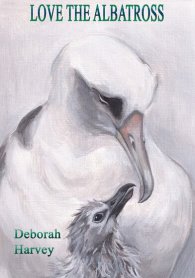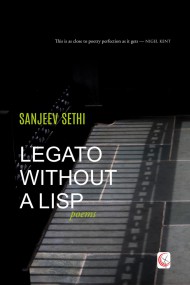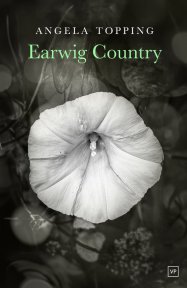
Deborah Harvey, Love the Albatross,
Indigo Dreams Publishing,
ISBN 0781912 876853, 78pp, £11.00.
A student of Kim Moore and Helen Mort, Harvey had already published five collections with Indigo Dreams Publishing, and it was a pleasure to read this latest offering. These days we seem surrounded by ‘trigger warnings’ and part of me thinks ALL poetry should come with a trigger warning; if it’s any good it should rouse and disturb you. Here, it is pertinent to note that the context of the poems is Harvey’s (unsought) estrangement from one of her children. In an interview with her colleague Colin Brown (with whom she runs the Leaping Word poetry consultancy) Harvey notes that she didn’t know ‘which poems would turn up’ in connection with this sad situation and acknowledges that her poems record emotional truths but not ‘my truth’ as what we write may not be the full truth of the subject. I resonate with her sense that poetry should be ‘a collaborative art, so always leave space for the reader to bring their own experience.’ The subject of estrangement may be an unusual one, but the experience of parents accommodating an empty nest (see ‘Subsong’) shows Harvey’s ability to connect beyond the specifics of her core subject to experiences shared more widely.
This intention to ‘leave space’ is well accomplished in this fine volume of poems, which is structured in three sections, but also yoked together by recurring images – predominantly avian (often featuring migratory birds, which suggest both long journeys to distant places – and the capacity to return). It is not only swifts but her uncle Noel’s racing pigeon that kept heading straight home; poem drafts are described as unpredictable ‘Fledglings’, with all their attendant habits, and the hope that
Maybe one day this poem will fly your way
a goose calling as it heads north.
Of course the albatross herself features, showing her predilection for extreme endeavors, and how the memories of those years confine her. ‘Once we were birds’ riffs on the Christian legend of the ‘soft self-wounding Pelican’ (to quote metaphysical poet Thomas Crashaw) who pecks at her own breast to feed her young.
The subtitle of the book is ‘Estrangement stories’ , and in part III especially ‘story’ becomes its own subject, iterating Harvey’s belief in the need for the reader to engage in their own way with what they read, on the day they are reading it. I did wonder (as I did when reading Fleur Adcock’s very personal poems about ex-husbands) how the estranged child might find their truth, their story here, but that is a matter for the poet herself and not the reader to agonise over.
Another repeated motif is that of the labyrinth, which both reminded me of Piranesi’s uncanny work, and also that according to the myths, it is possible to find your way out of the labyrinth. And in the mean time you have finely crafted poems to occupy you, whether it is the effective use of the prose poem form or more familiar lineated poems. ‘Just when you get yourself out of one labyrinth’ moves at pace, with ampersands linking ideas; ‘perhaps it’s the aperture of a shell that’s the whorl of your newborn’s ear & you’re clattering round & round its spiral steps…’
In an interview for Wombwell Radio, Harvey described the condition of the writer as ‘an apprentice for life.’ This humility is engaging; I would add that in Love the Albatross we find a writer who is fully-fledged, yet still keen to break new ground. It’s worth noting that a number of these poems were shortlisted in prestigious competitions; no matter how subjective a criterion this is, you will doubtless find within this book poems you would want to award a prize to.
Hannah Stone
To order this book click here
Hannah Stone is the author of Lodestone (Stairwell Books, 2016), Missing Miles (Indigo Dreams Publishing, 2017), Swn y Morloi (Maytree Press, 2019) and several collaborations, including Fit to Bust with Pamela Scobie (Runcible Spoon, 2020). She convenes the poets/composers forum for Leeds Leider, curates Nowt but Verse for Leeds Library, is poet theologian in Virtual Residence for Leeds Church Institute and editor of the literary journal Dream Catcher. Contact her on hannahstone14@hotmail.com for readings, workshops or book purchases.
Sanjeev Sethi, Legato Without a Lisp,
CLASSIX, New Delhi, Calcutta, 2024,
ISBN 987-81-19858-79-8, 600 INR, $17.99.
The title Legato Without a Lisp, Sanjeev Sethi's eighth collection of poetry, is a curious, almost oxymoronic blend of precision and imperfection. "Legato" evokes a smooth, flowing connection in music, a seamless transition from one note to the next. Yet, paired with "Without a Lisp," which suggests a flaw in articulation, the title seems to hint at the poet’s exploration of life's inherent contradictions—where moments of fluidity are often punctuated by human limitations or stumbles. This balancing act of beauty and blemish is a theme Sethi weaves throughout the collection, where his lyrical meditations intersect with the realities of aging, memory, spirituality, and societal discord.
In Recognition, Sethi invites readers into a space where memory haunts the present. The poem opens with a vivid recollection: “The taste of the twin Génoise sponge/ baked and partly burnt/ for my fourth birthday bash/ lingers in the lineaments of/ my mouth…” The juxtaposition of something as simple and fleeting as a birthday cake with the lasting emotional imprint it leaves reveals Sethi’s delicate handling of nostalgia. The "ad patres" mother, long deceased, remains present in these sensory memories, as if time has blurred its boundaries, allowing the past to exist within the now. The final lines—“Maturation lends a lesson:/ To seek worthiness/ in a curate's egg”—suggest a philosophical acceptance of life's imperfections. The unfinished conversation of memory disrupts, yet provides solace, for in "poetizing," Sethi suggests, there is a form of meditation, or "zazen."
A different kind of haunting appears in Expiration, where the poet reflects on the socioeconomic disparities between himself and a cousin: “Over the years,/ his being behind the eight ball/ kneaded the gossip flour.” Here, memory isn’t simply a comforting echo, but a reminder of the estrangement brought on by economic inequalities. The bluntness of life’s finality is conveyed through the WhatsApp message that informs the speaker of his cousin’s death, underscoring the cold detachment that technology often adds to human loss. In this way, memory is not just personal but socially framed, reminding us of the forces—class, education—that shape our relations with those we consider kin.
The theme of free will versus fate is explored in Earnings, where Sethi muses on the inner life of the mind, described as “a happy stalker.” The poem moves from the whimsical observation of trees sharing stories to an existential reflection on human agency: “If we were certain/ there is no God/ finality or fate;/ there would be/ a fair playing field.” This line stands out as a meditation on the uncertainty that governs human lives, suggesting that submission to the mysteries of fate allows for a blooming of the "invisible florets within us." Sethi's language here is playful yet sincere and earnest, inviting readers to ponder how much of our lives is truly within our control.
In Indenture, Sethi meditates on the transient nature of life, employing icicles as a metaphor for both reward and affliction. Sentience, or self-awareness, cushions us from the harsher truths of existence, yet also binds us to them. There’s a sense of ambiguity here—whether the poem’s subject is God, a lover, or both, remains unclear. This ambivalence is a recurring theme in Sethi's work, where love, divinity, and personal relationships often blur into one another, leaving the reader in a space where certainty dissolves.
Humor, a rare but refreshing quality in poetry, shines through in Self-Authored Choice. Sethi likens modern poets to "word-warriors" who “add nations/ as yolk in the egg/ of achievement/ with every acceptance/ from a literary journal." The metaphor of poets as conquerors, adding territories to their creative empire with each publication, is witty and self-aware, offering a humorous critique of the literary world’s obsession with recognition and success. Sethi’s playful tone in this poem offers a moment of levity amidst the more serious contemplations of fate, memory, and loss.
The collection also delves into questions of spirituality, often blending the sacred with the personal. In Directive, the poet's introspective journey is marked by a “moment of reckoning,” where the trees around him “sneezed,” a quirky detail that adds a touch of absurdity to the solemn meditation. Yet, it is this very blending of the mundane and the divine that makes Sethi’s spiritual reflections resonate. The natural world becomes both a participant and a witness to his personal epiphanies, as divinity is found in the quiet, waking moments of life.
One of the most striking poems in the collection is Legerdemain, where Sethi reflects on the relationship between money and empathy: “Cash is tongueless, on and off; it lips/ in a parlance that pierces the inner/ architecture.” The metaphor of money as something that both speaks and silences taps into the poet’s exploration of the commodification of human relationships, especially in the context of artistic labor. There’s a yearning for empathy, for understanding, but the poem ends with the poet locked in a “charade,” suggesting that monetary concerns often drown out more deliberate emotional connections.
Throughout Legato Without a Lisp, Sethi’s language is dense, textured, and sometimes even opaque. His use of metaphor and allegory invites multiple readings, where deeper meanings slowly unfold. In Crucible, a deeply personal poem, the poet recounts a night spent trying to stave off a loved one’s death: “In the dead of night, the medical squad,/ and I kept you away from the queue to/ quietus.” The poem is filled with a palpable anxiety, not just about death, but about the fragility of life itself, where even medical interventions seem tenuous in the face of mortality. The poem ends on a somber note, as the poet reflects on the aftermath of this vigil, haunted by the memory of the event
Finally, poems such as Sway and Hypothesis extend the themes of uncertainty and spiritual inquiry. In Sway, happiness arrives, fleeting but intense, as a loved one's health reports bring relief. Sethi’s verse captures the ephemerality of such joy, a momentary erasure of earlier sorrows. In Hypothesis, a friend's recounting of their mother's possible sexual trauma weaves in themes of generational suffering and the complexities of dealing with buried pain. This poem, like many others in the collection, touches on the fragility of human connection and the enduring impact of memory.
In its entirety, Legato Without a Lisp is a collection that moves fluidly between the personal and the universal, the humorous and the melancholic. Sethi’s skill lies in his ability to take the reader on a journey through the landscapes of memory, spirituality, and societal critique, all while maintaining a lyrical grace that never falters. His poems, much like the title suggests, take breaks at times in their attempt to articulate life’s complexities, but in those very breaks, they find their strength.
Abhik Ganguly
To order this book click here
Abhik Ganguly is a poet, writer, and seeker. He's currently a Junior Research Fellow pursuing his PhD at the Department of English, University of Delhi. He has won events like the 'Poetry on Spring' contest organized by House of Harmony 2023. His works have been published in various outlets, such as the Monograph, Indian Review, Hooghly Review, Setu Magazine, Criterion Journal, and others.
Angela Topping, Earwig Country,
Valley Press, 2024. ISBN 9781915606228, 120pp, £15.
This is a substantial collection of new poems from a poet who’s been writing solid personal lyric poems for many years, and whose body of work reveals a commitment to clarity, precision and observation that is second to none.
On the whole, my personal tastes run the spectrum from extreme experimentation (Bob Cobbing), through the surreal and the linguistically innovative to the more expansive poetics of many poets writing today. I prick up my years if I hear the words, “how is that poetry?” and am immediately eager to find out what that’s all about.
So what am I doing reading Angela Topping, a poet as much in the tradition of Thomas Hardy, Edward Thomas and poets such as UA Fanthorpe and Fleur Adcock as anyone else?
Because, first of all, it fulfils one of Wallace Steven’s rubrics for good poetry: it gives pleasure. There is often the pleasure of recognition in these poems, and the pleasure of exactness of language, and sometimes the pleasure of ‘getting your own back’ on the bullies in ‘Summer School Skivvy’, about a summer job where:
...these precious little madams
had hounded, belittled and excluded me.
Her eyes went wide when I told her she,
in all her tweedy arrogance, had let it happen.
Why don’t you teach them some manners?
I hope I said, before leaving to catch my train
back up North to A levels, university,
my hard-won future, while she gaped at me.
This poem come from the first section of nine, which gather subjects from growing up through love poems, poems on ‘nature in trouble’, the body, through to poems of mourning, and ladies in literature. The title poem, ‘Earwig Country’, talks of the darker underbelly of the natural world, the earwigs and creepy crawlies that are ‘coming for us still.’ Salgados Wetlands, whilst ostensibly being about a foreign holiday, is as much about the gap between the rich holiday makers in their resort hotel and the wild world outside their gated communities. It has something of the ire of John Clare on enclosures about it.
There is a strong awareness of injustice, of class and entitlement in some of these poems. One of the literary ladies is Maggie Tulliver, from George Elliot’s The Mill on the Floss. Here, she has survived Eliot’s culling, and her defiance of convention lives on in Malala and Greta Thurnberg. I’m not sure the poem quite justifies that comparison, but that maybe because I’ve never read the original; but it does illustrate one of the major themes in this collection: that of the working class child rising ‘above her station’ to become educated and ‘answering back’ to a culture that would put her down.
In a collection of nearly 80 poems, there are bound to be a few weaker poems, poems that perhaps show the weakness of the personal lyric rather than its strengths. But there are remarkably few missteps. There are times when I almost wished for her to go a little further to the edge of language; but the plain-speaking and the relatively comprehensible is where she is most comfortable. Her use of apostrophe in The Riddle of Angela is an interesting experiment, though. It uses a technique Ginsberg uses in Howl, and occasionally reaches a psychological truth she doesn’t reach elsewhere: Who lives as a child, reaching for gaudy baubles and wanting her mother. That’s both uniquely Angela and also universally true.
The other problem with a collection of this length, of course, is that you can’t possibly highlight every delight in it. I could talk for much longer about poems like ‘Writing On the Body’, ‘Honest John’, ‘Starlingcide’, ‘Sometime Before Myra’ and many others. I think you the reader will have to discover those for yourself.
Steven Waling
To buy this book click here
Steven Waling's latest collection, Lockdown Lattitudes, was published by Leafe Press in 2021. His next collection, Any Road Up Deep North, will be published as a box of haiku in the spring of 2025.



